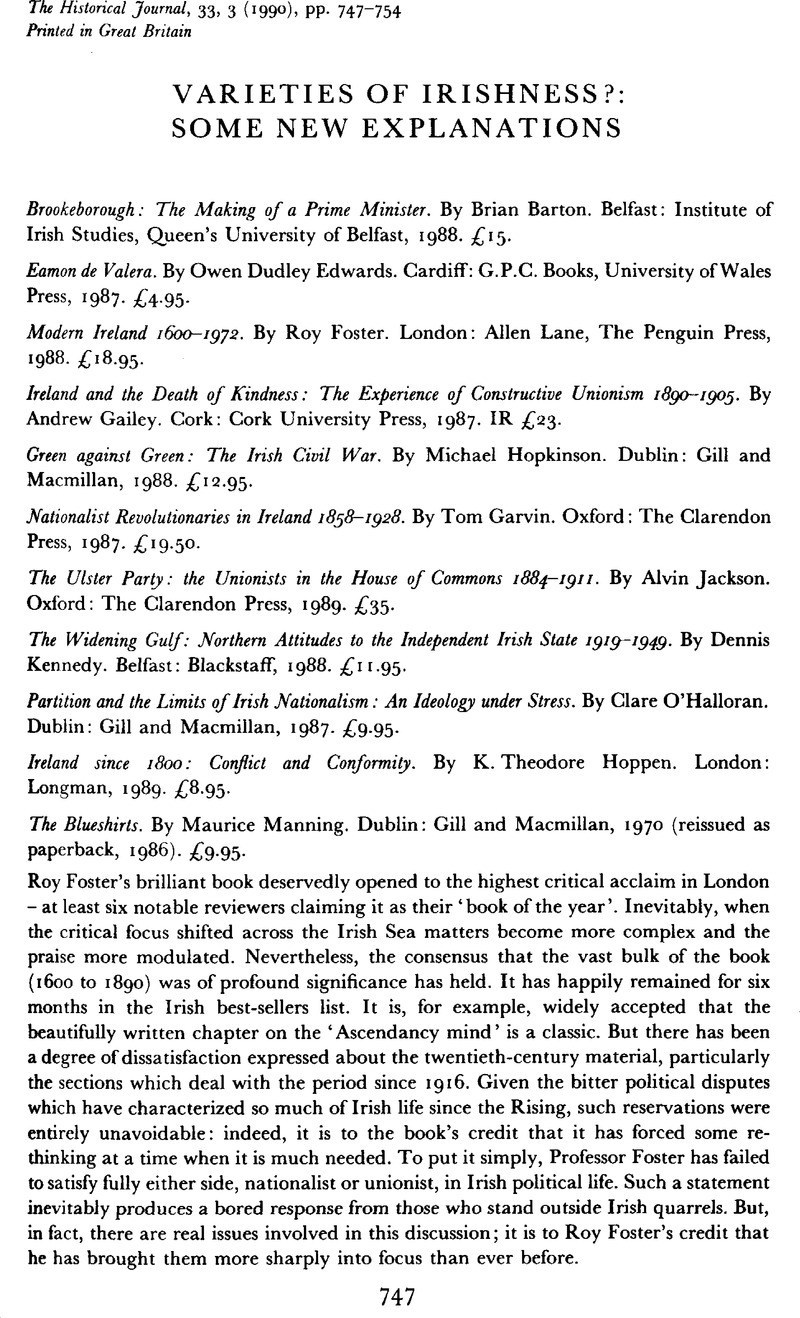No CrossRef data available.
Article contents
Varieties of Irishness?: Some New Explanations
Published online by Cambridge University Press: 11 February 2009
Abstract

- Type
- Review Articles
- Information
- Copyright
- Copyright © Cambridge University Press 1990
References
1 For an elaboration of this argument, see Bew, Paul, Patterson, Henry and Hazelkorn, Ellen, The dynamics of Irish politics (London, 1989)Google Scholar. It is also worth considering the valuable work of Dunphy, Richard, ‘Class power and the Fianna Fail party: a study of hegemony in Irish politics’ (unpublished Ph.D dissertation, European University Institute, 1988)Google Scholar.
2 Shannon, Catherine B., Arthur J. Balfour and Ireland 1874–1922 (Washington, DC, 1988), p. 281Google Scholar. This impressive study of constructive unionist policy has ‘national’ credentials to which Gailey (see below) does not aspire, but the author accepts the substance of Balfour's claim, whilst castigating his support for Ulster unionists.
3 The land question and the Irish economy 1870–1903 (Cambridge, Mass., 1971)Google Scholar.
4 Landlords and tenants in Ireland 1848–1914 (Dundalk, 1984)Google Scholar.
5 See Shannon, , Arthur J. Balfour, p. 294 n. 19Google Scholar.
6 See, notably, the critical comment on Modern Ireland by academic lawyer and unionist politician, David Trimble; ‘The Unionist view of home rule is also described as “ludicrously extreme in retrospect” (p. 470). Was it so extreme when “the new regime was in a very real sense confessional” (p. 534) and de Valera by “institutionalising a powerful Catholic ethos”…“demonstrated to Ulster Protestants that the institutions of a united Ireland would be oppressively Catholic ” (p. 545)? In the light of these three quotations from Modern Ireland, the reference to Unionist opposition to home rule as being “ludicrously extreme” does seem a little strange’: Cultural traditions in Northern Ireland, Institute of Irish Studies (Belfast, 1989), pp. 48–9Google Scholar. Trimble's intervention is part of a response to a lecture ‘Varieties of Irishness’ by ProfessorFoster, delivered on 3 03 1989 to the Cultural Traditions group conference at the university of Ulster at ColeraineGoogle Scholar. The text of the lecture and the responses have been edited by Maurna Crozier in an Institute of Irish Studies publication. There is clearly a substantial grievance here. But Dr Foster's implicit point is that Redmondite home rule (as opposed to the ‘de Valera dispensation’) could well have been reasonably tolerant. On this problem, see Bew, Paul, Conflict and conciliation in Ireland 1890–1910 (Oxford, 1987)Google Scholar. The Cultural Traditions group is part of a new initiative materially supported by a UK government understandably anxious to claim the high moral ground and laudably hoping to bring catholics and protestants together. According to The Times, 17 April 1989, ‘The aim is to show that parts of both cultures often have a common root and they are cause for unity more than division.‘ “We want culture to be a cement for the two communities,” said Dr Brian Mawhinney, the Northern Ireland Office minister of education. According to this Times report, ‘Traditional bands…are too often seen as belonging to the catholic or protestant community and [as] divisive.’
7 Wilson, Tom, Ulster: conflict and consent (Oxford, 1989)Google Scholar.
8 Aughey, Arthur, The unionist response to the Anglo-Irish agreement (Blackstaff, Belfast, 1989)Google Scholar.
9 ‘The positive virtues of the member for Lisnaskea', Linenhall Review, V (1988), 26Google Scholar.
10 See Bew, P., Gibbon, P. and Patterson, H., The state in Northern Ireland (Manchester, 1979), ch. IVGoogle Scholar.
11 See, for example, SirCraig's, James speech in Belfast, , Irish Times, 20 01 1934Google Scholar: ‘I am convinced that to have accepted direct rule by Westminster in all matters, as an alternative to the Act of 1920, would in the long run have been against the interests of Ulster’. It is clear from this speech that Craig fully shared the delusion that a devolved parliament could definitively protect Ulster Unionism from hostile currents either internally or externally – a delusion that was decisively punctured in 1972 with the prorogation of Stormont. Craig may have unconsciously undermined devolution by his ‘integrationist’ pursuit of UK economic and social parity, but he still remained an ardent, if incoherent, supporter of a concept of devolution which maximized protestant unity across the social classes: ‘I believe Ulster and Belfast have been built on years and years of the most perfect democracy that one could conceive’, Irish Times, 8 January 1934.
12 See Whyte, John, Northern Ireland and the researchers, p. 109 (Oxford, forthcoming)Google Scholar. ProfessorHarkness, David makes the same point in his ‘Nation state and national identity in Ireland’ in ‘Irishness in a changing society’, edited by the Princess Grace Library (Gerard Cross, 1988), p. 130Google Scholar. On the problem this creates for Irish republicans, see Patterson's, Henry powerful study: The Politics of illusion: republicanism and socialism in modern Ireland (London, 1989)Google Scholar.


